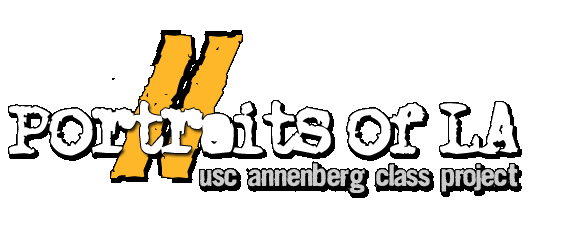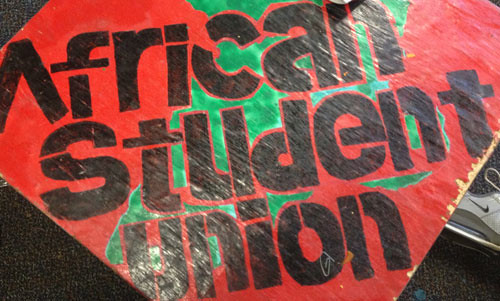


“Imagine being in class full of white students and you’re the only black person there. I go through that all the time. I took a core class last semester and I was one of 3 black students in there. It’s amazing to me how huge our student body is and how small the
African-American population is,” McClelland said. Born and raised in Dallas, Texas, McClelland moved to San Diego at 14 and attended school at Junipero Serra High. Coming from a predominately African-American neighborhood she knew that getting into a tier-1 university was hard for students just like her.
“I had really good grades in high school and my SAT scores were good enough to get me into great schools. So, I applied to all the Ivy League schools and the top four UC campuses. I chose U.C.L.A because my mom wanted me to stay in California and I really liked the academic programs. I know there are a lot of kids from Black communities who want to go to college, but they either don’t have the resources to get in or they are afraid that they won’t get accepted,” she said.
Why would prospective students of color be afraid of not getting into schools like U.C.L.A? The current demographics could be a reason of discouragement for students looking into the school. U.C.L.A has 27,941 undergraduate students enrolled according to fall 2012 enrollment reports and that number consists of 35% Asian, 29% White, 17% Hispanic and 3.8% African-American.
The percentage for many is an eye opener especially for the African-American community. It is the smallest group, alongside Native American, represented and it is quite disappointing. Some students are taking matters into their own hands by joining outreach groups to help recruit prospects.
“Not a lot of students know about the struggle we have as student leadership to get more students from lower-income families to our school. A good majority of students who come from lower-income families are black and Latino students. We need them,” junior Kamilah Moore said.
Moore is the Vice-Chair for Afrikan Student Union an organization used to promote educational rights of African-American students. She works with other student ran organizations to help mentor and recruit inner-city youth to come to U.C.L.A. “We have to let the high school students out there know that they can get resources to come to good schools like U.C.L.A. Not a lot of students here know the hard-work we are doing to try to encourage minorities to apply,” she said.
She says she always knew that she would attend U.C.L.A from a school field trip she had in elementary school. One more year left and Moore will be the first in her family to receive a college degree. How does it make her feel? Liberated. “It feels good to be here. It’s important for me to graduate. I want to be a positive example for my family. Since that day of my 3rd grade field trip when I was standing on U.C.L.A.’s steps I told myself, ‘This is the school I’m going to!” she said, “ When I got into high school I was unsure about college because of my given circumstances at the time. But, I finally just stepped out on faith and applied to U.C.L.A.”
There are plenty of high school and transfer students who are following in her footsteps who want to get their degree from U.C.L.A. So far applications for the 2013-2014 school year seem to be reaching record highs.
The undergraduate applications for the fall recently hit a record high of 99,559. This number represents the most applications U.C.L.A. has ever received.The next step the university takes is admission review. U.C.L.A uses a “holistic” approach to undergraduate admissions. Each application is reviewed for test scores, grades, socioeconomic status, disadvantaged background, and evidence of strong qualities to overcome adversity. Holistic admissions was designed to help evaluate applicants beyond their academic numbers.
The holistic review was adopted after the state of California banned racial preferences in 1996 and enforced Proposition 209. Proposition 209 prohibits state government institutions (public and private) from considering race, sex or ethnicity as a reason for acceptance. By taking on this review, the university wanted to make sure that their student body remained academically diverse without affirmative action.
But, it doesn’t seem to be working. Despite the number of efforts and policies that U.C.L.A tries to carry out, diversity in these groups remains drastically smaller than other races. “I always find myself being the only Black person inside my political classes or sciences classes, it happens all the time. It makes you feel uncomfortable and sometimes unwelcome when you don’t see many people of your race,” Moore said.
There are plenty of high school and transfer students who are following in her footsteps who want to get their degree from U.C.L.A. So far applications for the 2013-2014 school year seem to be reaching record highs. The undergraduate applications for the fall recently hit a record high of 99,559. This number represents the most applications U.C.L.A. has ever received.
As a Los Angeles native, Moore knows that UCLA’s demographics do not reflect the diverse city that surrounds it. “I feel like administration is working on the current demographics and trying to do more to make sure that the campus will be more diverse, but obviously they aren’t doing enough. There is more that Chancellor Gene Block could be doing or other administrators could be doing to ensure that more people who reflect LA’s population are represented,” she said.
Although the numbers speak for themselves, one teacher believes UCLA’s holistic admissions is actually benefiting minorities and going against Proposition 209. Law Professor Richard Sander began studying college admissions facts to see if it was abiding by Prop 209 and he found a strange pattern. Sanders believes U.C.L.A. accepted a significantly higher percentage of blacks and Latinos than whites and Asians with the same holistic score.
In a New York Times article Sanders stated that students active in the university outreach program had an advantage in admissions. “My guess is that this happened because some admissions officers only knew about the race of applicants by virtue of their participation in outreach sessions,” he said.

U.C.L.A officials said that Sander’s conclusions were not substantial and racial preferences were not considered. Robert Mare, a sociology professor at U.C.L.A., created a study called the Mare report that stated everything was working as intended. So why does this matter now? In just a few weeks the Supreme Court will be ruling on the means of affirmative action and higher education. This decision can cause further complication for campuses like U.C.L.A.
“This new affirmative action case was [made] to make it seem like we were having reverse racism. So, they think we’re trying to get blacks, Hispanics and other minorities in college and forget about white people? But, that’s not true! They are still the majority in college and to be honest they’re probably still going to be the most in college,” McClelland said.
Senior Molly Katz agrees with McClelland. She is a white student at U.C.L.A. and knows that the numbers for White students will always be big.
“Its very interesting. The climate is certainly different from this ‘post-racial’ society everyone thinks it is. I think that U.C.L.A. can do a better job at helping the diversity. We are very diverse but there’s not enough diversity for certain ethnic groups. Especially within the African-American community,” Katz said.
Katz along several other students on campus is working towards a diversity intuitive to help every racial, sexual orientation and cultural group at U.C.L.A.’s campus be heard.
“ Not everyone on campus comes from a racially mixed neighborhood or community. Some people here came from white suburban places where there wasn’t much diversity. So they think, ‘Oh U.C.L.A. is hella diverse.’ Whereas, I come from a very diverse community and I come here and I’m thinking where is the diversity? Either way the minorities still need a chance here. Administration needs to do something about it.”
Affirmative Action Remix
Government and Media have plenty to say about the current affirmative action case. This video is a conglomerate of what people in politics, media and students have to say about the change in higher education admissions.